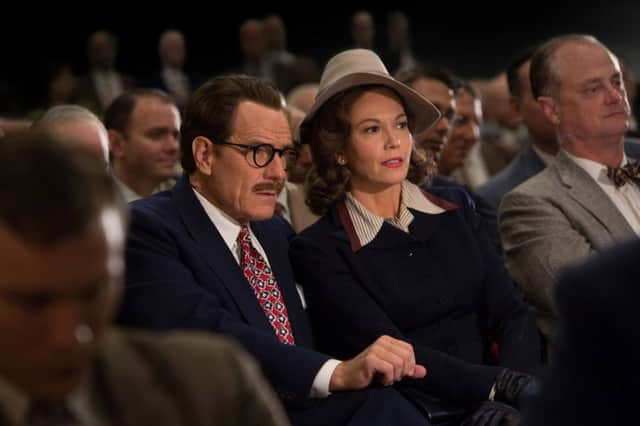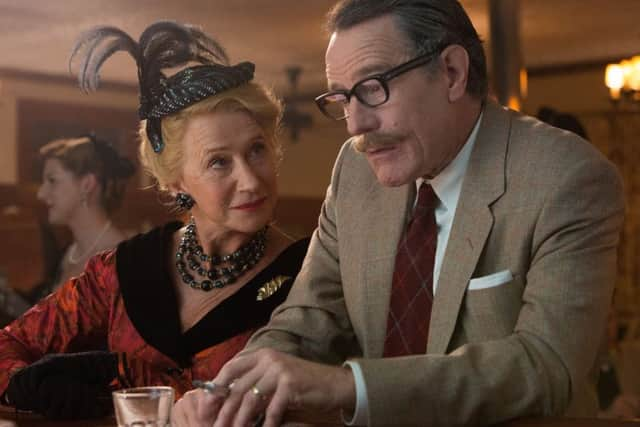Bryan Cranston on playing blacklisted screenwriter Dalton Trumbo


Until you’re actually in that situation, it’s difficult to say how you would react,” says Bryan Cranston. The Breaking Bad star isn’t analysing the desperate downward spiral of Walter White, the cancer-riddled chemistry teacher-turned-crystal-meth dealer he played in the revered show that belatedly made him an A-lister (he’ll turn 60 in March). He’s referring to the inevitable what-would-you-do? question he found himself confronting after signing on to play Dalton Trumbo, the blacklisted Hollywood screenwriter whose refusal to name names during the Communist witch-hunts of the 1940s and 1950s the new biopic, Trumbo, explores.
Trumbo, who died in 1976, was a National Book Award-winner and the highest paid screenwriter in Hollywood. As such he was the most prominent and outspoken of the so-called “Hollywood Ten”, the group of writers and filmmakers charged in 1947 with contempt of the Congress and later imprisoned for rejecting US government efforts to compel them to reveal details of their left-leaning political affiliations.
Advertisement
Hide Ad“The House Un-American Activities Committee thought there was this collusion to promulgate Communism through film, which was a ridiculous notion,” elaborates Cranston of the Cold War paranoia that swept through all facets of America life in the aftermath of the Second World War. “It was a breach of First Amendment rights and a man went to prison for a year for committing no crime.”


That, he says, makes Trumbo’s story as relevant today as it was then. “I think any time a government over-reaches its powers to oppress the civil rights of its citizenry is cause for alarm.” But Trumbo’s story is as fascinating as much for the subversive way he combated such persecution as it is for the persecution he suffered. Shunned by Hollywood and demonised in the press by powerful gossip columnists such as Hedda Hopper (played in the film by Helen Mirren), Trumbo took to writing anonymously and pseudonymously, partially to earn a living to support his family, but also to undermine a system beholden to fear.
His first success, for instance, remains one of the most beloved films ever made: Roman Holiday. Unable to sell it under his own name, Trumbo recruited fellow screenwriter Ian McLellan Hunter (who was blacklisted at a later point) to act as a front, splitting the fee but not the credit. It went on to win the Academy Award for best screenplay in 1954. Trumbo had to content himself with watching it on television with his family at home.
Trumbo was only given the award posthumously in 1993 and although rumours of his involvement were rife at the time, it didn’t help him land any lucrative screenwriting work, covert or otherwise.
Instead he went to work for Frank King, a huckster who ran a low-rent exploitation movie company with his brother Maurice. As detailed in the film, Trumbo began churning out scripts for King Bros Productions at $1,500 a pop, setting up a production line in his own home (he wrote at all hours and frequently in the bathtub), eventually recruiting his blacklisted colleagues to help him meet demand. He also won a second Oscar – this time under the pseudonym of Rob Rich – for 1956’s The Brave One, thus making a further mockery the government’s and the industry’s efforts to keep him from working.


Again he wasn’t personally awarded the Oscar until 1975, by which point he’d already started receiving credits on movies again, thanks to Kirk Douglas and Otto Preminger, who risked their own careers by openly hiring him to write Spartacus and Exodus respectively. (The two films most directly responsible for ending the blacklist were, coincidentally, both about overthrowing oppression.)
Advertisement
Hide AdGiven the Academy’s timidity in confronting the damage wrought upon the scores of writers, directors, actors and producers affected by the blacklist, it’s perhaps unsurprising that the Oscars come in for some scathing criticism in Trumbo.
At one point Cranston’s Dalton denounces the award as a meaningless statuette stained with the blood of his friends. Ironically, Cranston has since picked up a Best Actor Oscar nomination for the role. Did he think at the time that Trumbo’s chances might be affected by its subject’s attitude towards the Oscars and Hollywood as a whole?
Advertisement
Hide Ad“That’s not something I focus on,” he says, diplomatically. “Our job is really to focus on trying to make the best film possible. And hopefully it resonates not only with critics, but with audiences that want to see an important story told in an entertaining way. If people beyond that want to celebrate it with a nomination,” he adds, “then great. But that’s certainly not a focus of mine.”
Cranston is sticking with politics for his next big role: he’s reprising his Tony-winning performance as troubled Democrat president Lyndon B Johnson in an HBO-produced adaptation of Robert Schenkkan’s hit Broadway play All the Way (like Trumbo it will be directed by Jay Roach).
As for reprising Walter White, he says he’s not against appearing in Breaking Bad creator Vince Gilligan’s spin-off show, Better Call Saul. “I don’t know if a cameo is on the cards,” he says. “It could be. And I would do it if Vince Gilligan wanted me to. I would absolutely do that.”
For the moment, though, all the talk of Trumbo has got him thinking about whether or not blacklisting still occurs.
“I think there is some self-imposed blacklisting in Hollywood,” he says, referring to the pariah-like status of Mel Gibson and recalling a time earlier in his own career when a film he was involved in fell apart after OJ Simpson signed on to star in it.
“If you have skeletons coming out of your closet, people don’t want to work with you. But I hope there aren’t any political blacklists,” he adds. “And I hope there aren’t any sexual orientation blacklists. I think we’re moving out of that as a society and I think that’s a great thing.”
• Trumbo is in cinemas from Friday. A season of Trumbo’s films screens aGlasgow Film Theatre from 1-16 February, www.glasgowfilm.org/theatre